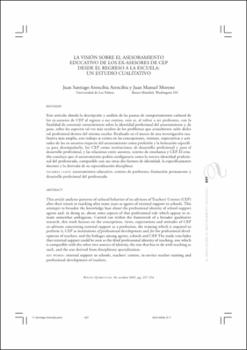La visión sobre el asesoramiento educativo de los ex-asesores del CEP desde el regreso a la escuela: un estudio cualitativo
Fecha
2005Resumen
Este artículo aborda la descripción y análisis de las pautas de comportamiento cultural de
los ex-asesores de CEP al regreso a sus centros, esto es, al volver a ser profesores, con la
finalidad de construir conocimiento sobre la identidad profesional del asesoramiento y, de
paso, sobre los aspectos tal vez más ocultos de los problemas que actualmente sufre dicho
rol profesional dentro del sistema escolar. Realizado en el marco de una investigación cualitativa
más amplia, este trabajo se centra en las concepciones, visiones, expectativas y actitudes
de los ex-asesores respecto del asesoramiento como profesión y la formación específica
para desempeñarlo, los CEP como instituciones de desarrollo profesional y para el
desarrollo profesional, y las relaciones entre asesores, centros de enseñanza y CEP. El estudio
concluye que el asesoramiento podría configurarse como la tercera identidad profesional
del profesorado, compatible con sus otras dos fuentes de identidad, la específicamente
docente y la derivada de su especialización disciplinar. This article analyzes patterns of cultural behavior of ex-advisors of Teachers’ Centres (CEP)
after their return to teaching after some years as agents of external support to schools. This
attempts to broaden the knowledge base about the professional identity of school support
agents and, in doing so, about some aspects of that professional role which appear to remain
somewhat ambiguous. Carried out within the framework of a broader qualitative
research, this work focuses on the conceptions, views, expectations and attitudes of CEP
ex-advisors concerning external support as a profession, the training which is required to
perform it, CEP as institutions of professional development and for the professional development
of teachers, and the linkages among agents, schools and CEP. The study concludes
that external support could be seen as the third professional identity of teaching, one which
is compatible with the other two sources of identity, the one that has to do with teaching as
such, and the one derived from disciplinary specialization.





